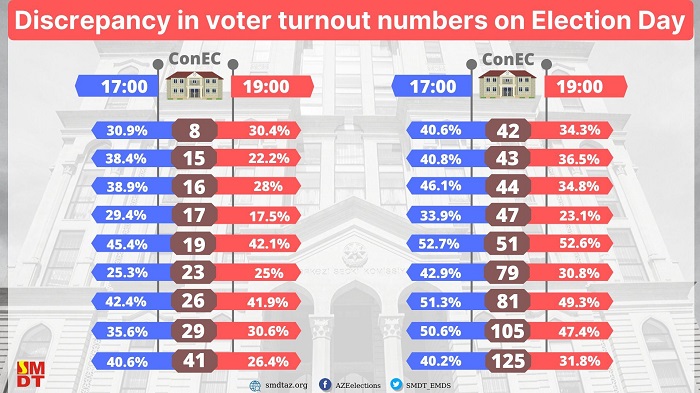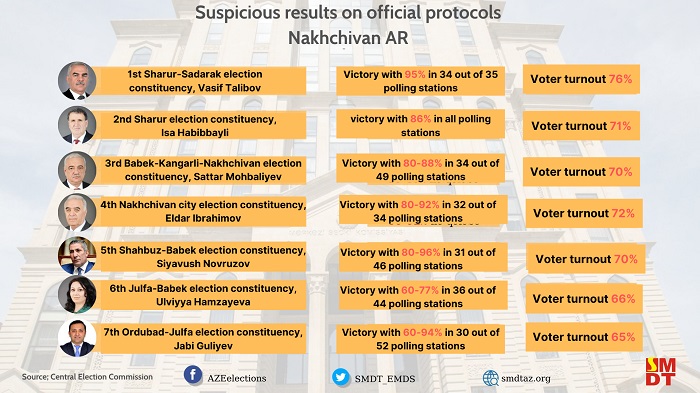EMDS Finds Azerbaijan Elections in Violation of National Legislation and International Standards

On February 9th, Azerbaijan held snap parliamentary elections with only two months’ notice - and nine months earlier than planned following a 99-1 vote to dissolve parliament in December 2019. The vote came after Prime Minister Novruz Mammadov unexpectedly resigned in October and was replaced by Ali Asadov, an ally of longtime President Ilham Aliyev.
Aliyev has remained in power since 2003, when he took over from his father. Referenda on presidential terms abolished term limits and extended terms to seven years. In 2017, Aliyev appointed his wife as his Vice President. International watchdog groups and citizen observers have regularly decried civil rights abuses during election periods including restrictions of freedom of assembly and expression, persecution of political opponents and activists, and voting irregularities.
MPs hailed their December decision to dissolve parliament as consistent with positive political reform, suggesting that that the snap elections would empower a younger generation of lawmakers to help “renew the Azerbaijani parliament’s activity so that it is consistent with the country’s dynamic development and comprehensive reform strategy.”
Aliyev’s New Azerbaijan Party won all but one seat in a vote that the Election Monitoring and Democracy Studies Center (EMDS) concluded violated international standards for free and fair elections, due to the closed pre-election environment, interference from local authorities on election-day, and cases of violence against independent and opposition candidates and observers.
EMDS based their conclusions - detailed in a February report - on long term observation of the pre-election environment and a sample-based observation (SBO) on election day - no small feat given the snap nature of the elections.
EMDS found that the pre-election environment improved in several ways since the 2015 parliamentary elections, detailed in their first and second interim reports. Notably, there was more public interest in the campaigns and a higher number of independent and opposition candidates. However, there were no discussions or televised debates featuring candidates from outside the president’s party. While EMDS did not record violations during the nomination and registration of candidates, the organization noted pressure against nominees and interference of local officials in campaign processes. The campaign process was largely violence-free, though controlled by the ruling party. EMDS concluded that overall, an uncompetitive campaign process coupled with long-term embedded restrictions on information limited voters’ choice and restricted political freedoms.
On election day, the organization deployed observers to 150 randomly sampled polling stations to conduct a sample-based observation. Several observers reported that they were removed from, or were asked to leave their posts. Moreover, observers noted similar fraudulent activity as recorded in previous elections, including cases of multiple votes per person, bussing in voters, ballot-box stuffing, and unregistered voting. Some voters reported being unable to find their names in voter lists. In addition to direct reports from deployed observers, EMDS was able to capture some of these violations by monitoring the Central Election Commission’s (CEC) live video feeds in polling stations, which EMDS shared on social media.
Finally, EMDS reports showed significantly lower turnout than the official figure released by the Central Election Commission (CEC) on election day, suggesting the snap election was not the agent of change hailed by the government. EMDS also noted discrepancies within official turnout data reported by the CEC, in particular that turnout figures announced throughout election day for certain constituencies appeared to be inflated compared to the final count at the end of the day (as recorded on the official protocols).

After the polls closed, observers reported serious violations during the vote-counting process. Most commonly, observers reported that the protocol did not accurately reflect results in over 50% of the polling stations sampled. In addition, observers in some stations were denied a copy of the protocol all together, and in close to 40% of stations, vote counting was carried out behind closed doors. EMDS also highlighted that the official CEC data showed a suspiciously similar vote share going to the winning candidates across polling stations in the same constituency along with above average turnout rates as illustrated below.
 EMDS called on the government to ensure publicly-funded debates to guarantee citizens' ability to make informed decisions and increase public interest in future elections. The organization also called on District Election Commissions and the CEC to investigate all reports of violations and hold officials accountable. Going forward, EMDS recommended implementing online registration of observers and reforming the electoral code following suggestions from domestic observers, OSCE/ ODIHR and the Venice Commission of the Council of Europe in order to improve democratic processes and grow trust in the state.
EMDS called on the government to ensure publicly-funded debates to guarantee citizens' ability to make informed decisions and increase public interest in future elections. The organization also called on District Election Commissions and the CEC to investigate all reports of violations and hold officials accountable. Going forward, EMDS recommended implementing online registration of observers and reforming the electoral code following suggestions from domestic observers, OSCE/ ODIHR and the Venice Commission of the Council of Europe in order to improve democratic processes and grow trust in the state.
 GNDEM
GNDEM